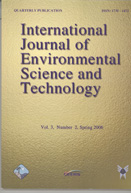
|
International Journal of Environment Science and Technology
Center for Environment and Energy Research and Studies (CEERS)
ISSN: 1735-1472
EISSN: 1735-1472
Vol. 10, No. 3, 2013, pp. 545-550
|
 Bioline Code: st13054
Bioline Code: st13054
Full paper language: English
Document type: Research Article
Document available free of charge
|
|
|
International Journal of Environment Science and Technology, Vol. 10, No. 3, 2013, pp. 545-550
| en |
Evaluation of the performance of a new freeze desalination technology
Mtombeni, T.; Maree, J.P.; Zvinowanda, C.M.; Asante, J.K.O.; Oosthuizen, F.S. & Louw, W.J.
Abstract
The use of desalination technologies which produce concentrated brines is acutely limited by inadequate waste brine disposal mechanisms such that the brine does not contaminate fresh water resources. The treatment of highly saline brine using freeze desalination technique trade marked as HybridICE™ technology was investigated at pilot scale. The capacity of the HybridICE™ process to generate fresh water by freeze desalination of brine was investigated in this study. Brine samples to feed into the HybridICE process unit were prepared in tanks with volume capacities between 1.0 and 10.0 m3 by dissolving common salt into tape water. The effects of refrigerant temperature, initial brine concentration, energy consumption were evaluated in relation to product ice quality. Feed brine samples were processed in batches in a closed system where it was continuously re-circulated to generate product ice and more concentrated residual small volume of brine stream. The quality of ice produced could be turned into potable water it terms of its low total dissolved salts and conductivity. The salt removal, based on the average chloride concentration in the ice samples, was 96 %. The energy utilization efficiency amounted to an average of ZAR 10.0/m3 water assuming energy cost of ZAR 0.39/kWh. The HybridICE™ technology was shown to be a better option than other desalination technologies currently in use, in terms of energy utilization and cleaner by-products.
Keywords
Desalination; Heat exchanger; Heat transfer; Freeze desalination; Brine; Impurity
|
| |
© International Journal of Environment Science and Technology
Alternative site location: http://www.ijest.org
|
|
